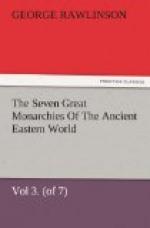Astyages, who succeeded to the Median throne about B.C. 593, had neither his father’s enterprise nor his ability. Born to an empire, and bred up in all the luxury of an Oriental Court, he seems to have been quite content with the lot which fortune appeared to have assigned him, and to have coveted no grander position. Tradition says that he was remarkably handsome, cautious, and of an easy and generous temper. Although the anecdotes related of his mode of life at Ecbatana by Herodotus, Xenophon, and Nicolas of Damascus, seem to be for the most part apocryphal, and at any rate come to us upon authority too weak to entitle them to a place in history, we may perhaps gather from the concurrent, descriptions of these three writers something of the general character of the Court over which he presided. Its leading features do not seem to have differed greatly from those of the Court of Assyria. The monarch lived secluded, and could only be seen by those who asked and obtained an audience. He was surrounded by guards and eunuchs, the latter of whom held most of the offices near the royal person. The Court was magnificent in its apparel, in its banquets, and in the number and organization of its attendants. The courtiers wore long flowing robes of many different colors, amongst which red and purple predominated, and adorned their necks with chains or collars of gold, and their wrists with bracelets of the same precious metal. Even the horses on which they rode had sometimes golden bits to their bridles. One officer of the Court was especially called “the King’s Eye;” another had the privilege of introducing strangers to him; a third was his cupbearer; a fourth his messenger. Guards torch-bearers, serving-men, ushers, and sweepers, were among the orders into which the lower sort of attendants were divided; while among the courtiers of the highest rank was a privileged class known as “the King’s table-companions”. The chief pastime in which the Court indulged was hunting. Generally this took place in a park or “paradise” near the capital; but sometimes the King and Court went out on a grand hunt into the open country, where lions, leopards, bears, wild boars, wild asses, antelopes, stags, and wild sheep abounded, and, when the beasts had been driven by beaters into a confined space, despatched them with arrows and javelins.
Prominent at the Court, according to Herodotus, was the priestly caste of the Magi. Held in the highest honor by both King and people, they were in constant attendance, ready to expound omens or dreams, and to give their advice on all matters of state policy. The religious ceremonial was, as a matter of course, under their charge; and it is probable that high state offices were often conferred upon them. Of all classes of the people they were the only one that could feel they had a real influence over the monarch, and might claim to share in his sovereignty.




